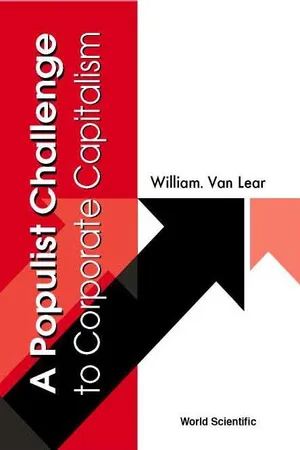
- 124 pages
- English
- PDF
- Available on iOS & Android
A Populist Challenge to Corporate Capitalism
About This Book
This book sets out some important developments in the evolution of capitalism and judges whether this evolution is in accord with fundamental American principles. Particular attention is paid to the corporation, business cycles, and various monetary issues. Are the corporation and the financial structure congruent with foundational principles of American society? Is contemporary monetary policy compatible with American principles and current economic evolution? These are the central questions posed by the book.
The text explores the issues of income distribution, business cycles, the great 1990s expansion and why it may end, and capitalist development stages. Business cycles, growth, and income distribution are all affected by the existing stage. The description and importance of money manager capitalism are discussed, and the current monetary policy regime is critiqued. In addition, the reform of monetary policy along heterodox lines is described.
The subsequent section of the text presents the central argument. America is based on a set of core principles, as laid out by important documents, thinkers, and eras. These principles inform American political economy and are populism-oriented. Yet, despite explicit foundational principles, US economic history demonstrates that the corporation has evolved along a path inconsistent with these principles. This book calls for a renewal of populist economic reform, and shows what contemporary forces may pull America along such a path.
A Populist Challenge to Corporate Capitalism is a discourse in political economy and is instructional in that it describes the causes of economic growth and cycles, and the process by which monetary policy affects economic activity. This effort pulls together elements of American history and important political–economic concepts to argue that contemporary monetary policy and the corporate form of business are not consistent with either money manager capitalism or the country's fundamental principles.
Frequently asked questions
Information
Table of contents
- Contents
- Acknowledgements
- Chapter 1: Introduction
- Chapter 2: Wealth and Income Distribution
- Chapter 3: Growth Cycles And Crises
- Chapter 4: Stages of Capitalism
- Chapter 5: Money Manager Capitalism
- Chapter 6: U.S. Monetary Policy
- Chapter 7: Foundational American Principles
- Chapter 8: Conclusion
- Bibliography
- Index